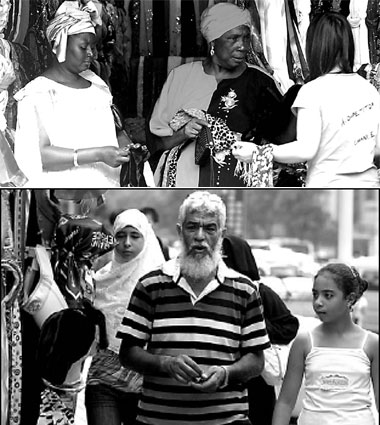Trading places
 |
|
Zhanxi Lu attracts African and Middle Eastern traders. Zou Zhongpin |
GUANGZHOU: Long considered a major supplier of top quality brands, Guangzhou is now enjoying a reputation, among foreign merchants, as a great destination to find hot bargains on second and third tier goods. Nestled deep within an obscure corner on the western edge of Guangzhou Railway Station is the noisy, chaotic trading street known as Zhanxi Lu.
Like a modern day Morocco, except with mopeds and minivans, Zhanxi Lu is a destination for hundreds of foreigners each day who browse, jostle and haggle over huge selections of garments, suits, shoes and handbags that never made it to the shelves of shopping centers and department stores.
The buyers travel from everywhere - Africa, the Middle East and Eastern Europe - several times a year, staying a week or so at a time, buying up anything they reckon on selling back home.
The surrounding area has responded to the trend with budget hotels and cheap eateries serving spicy food. At the same time, hundreds of one-man delivery companies were also created. The workers move the goods from Zhanxi Lu to low-rent storerooms, waiting vans or freight forwarders, often several times a day.
For the most part, the visitors are using a loophole that allows them to come as tourists and take home commercial quantities of goods, which they resell at a markup. While some are running their own import-export businesses, many of them are one-man "corporations" - sourcing, buying, transporting and delivering their goods - to sell themselves or on behalf of friends.
Currently, Guangzhou Customs officials say, aside from restricted items - drugs, firearms and rare animals - other commodities such as garments can be taken out as long as they don't exceed the upper limit for traveler's luggage.
"Four years ago, there was nothing in this area," says a security officer at Kinbo Fashion City, one of many centers frequented by foreigners.
"Now, maybe 300 foreigners come here everyday," he adds.
"The goods here are of good quality," says Walter, a South African who bought a huge collection of men's suits.
"The suits I buy here can be sold for 50 to 100 percent profit back home. The challenge is to get these through customs. It is easier to do it with no-name suits, so that's what I buy."
Maxine, also from South Africa, comes to Guangzhou three to four times a year, to buy clothes, shoes and other goods. The garments she bought were fetched away by a local worker who waited patiently as she looked for belts and leather goods.
"Guangzhou has many goods to buy and the quality is good," she says. "If I bring out (goods) as samples, there is no problem at customs." Back in Africa, "there is no limit to what you bring in. This is the African way of doing business."
Ali, a Kuwaiti, who runs his own import-export company there, just finalized a deal with a watch wholesaler.
"I come to Guangzhou maybe three to four times a year and mainly buy ceramics, but also leather goods and watches," he says.
He says he plans to sell them for a profit of about 70 to 80 percent, perhaps even 100 percent.
"I come to China because Kuwait is a trading post, nothing is made there. The quality of the goods is good. Everybody knows about Guangzhou now," he says.
As Walter hurried off with his wife and child and a courier in tow, he said he would be back the next day for another round of buying before flying out later that day.
"It is a lot of work," he says. "But you just do what you can to survive."
(China Daily 08/17/2007 page20)














